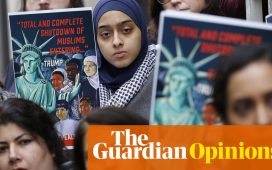A New Yorker who gained US citizenship as a child is suddenly facing deportation, along with several green card-holding members of his family, after apparent targeting by the Trump administration in what the family believes is a clear case of anti-Muslim bias.
None of the individuals have a criminal record, and say the Department of Homeland Security (DHS) only raised questions about the validity of their immigration status after another relative was arrested following a terrorist incident in the city. The government’s actions have alarmed advocates and led to them accusing officials of meting out unfair “collective punishment”.
Ahsan Ullah, 32, an electrician from Brooklyn, was placed in immigration detention in Kearny, New Jersey, on 22 October. He spent about four weeks separated from his American wife and three children before being released on bond last Tuesday pending the outcome of his case.
Four of his relatives, who all hold green cards, are also fighting government efforts to strip them of their US residency status. Since Trump came into office, the number of such denaturalization and citizenship revocation cases filed by DHS has surged.

“Citizenship is permanently conditional for many people who were not born here,” said Fahd Ahmed, executive director of the advocacy group Desis Rising Up and Moving (Drum), which has been providing support to the Ullah family.
“At a time when we are seeing a white nationalist current in government and society that wants to depopulate communities of color from this country, these cases are an indication of how their tactics and attacks are evolving.”
Ahsan was born in Bangladesh and adopted by his uncle at a young age, the family said.
After the uncle won a US visa through the diversity lottery program, Ahsan was granted a green card. He migrated to the US at eight years old and became a citizen several years later.
Meanwhile, his uncle successfully petitioned to bring his sister, Ahsan’s biological mother and four siblings to the country as permanent residents in 2011.
The family assumed their future in the US was secure. They focused on going to school, building careers and starting families. Ahsan became an electrician, got married and had three children.
But everything changed in December 2017, when one of Ahsan’s brothers, Akayed, was arrested for detonating a homemade pipe bomb in a crowded New York City subway station. He was the only person injured, in what was seen as a botched attack.
Family members both in the US and Bangladesh were questioned and none was found to have assisted the 27-year-old or to be supportive of terrorist organizations. Akayed was convicted of several terrorism offenses in 2018 and will be sentenced in February.
Sherin, Ahsan’s wife, 30, said that the day Akayed was arrested the rest of the family was utterly shocked to learn what he had done.
“For at least three, four months we were in disbelief,” she said. “We didn’t think [Akayed] was capable of this.”
From the moment of Akayed’s arrest, other family members say that despite being cleared by law enforcement, they began to see consequences.
Ahsan recounted receiving a letter from the bank notifying him that his personal and business banking accounts would be closed, and that the FBI put his business license on hold.
Wary clients cancelled their contracts, he said. His mother and siblings would see New York police department squad cars parked regularly near their building and other places they frequented, including their mosque, which they had never remembered seeing before.
Then, in April 2019, Ahsan received a letter out of the blue from US Citizenship and Immigration Services (USCIS), part of the DHS, stating that the agency planned to cancel his US citizenship on the grounds it was not lawfully obtained.
In a panic, his mother and siblings applied for citizenship but soon received news that not only had their application d been denied but that the DHS intended to revoke their green cards. On 6 November, Ullah’s mother and one of his sisters were detained for two days.
“After all this time, we [had] mentally and physically bonded with this country, and love this country so much,” said Ayfa, Ahsan’s 22-year-old sister, the day she was released from detention. “How can you disown a person just like that?”
The family is now trying to fight the agency’s orders.
In paperwork issued to the family, which was reviewed by the Guardian, the DHS claims that Ahsan, his mother and siblings have no legal or biological relationship to the uncle whose original success in the green card lottery facilitated the others’ settling in the US. Lawyers for the family said they are gathering the paperwork to prove their relationships.
The family and their advocates said the treatment amounts to collective punishment. “This is retribution for sharing the same DNA” as someone accused of terrorism, Ahsan said in a phone call from the Hudson county correctional facility in New Jersey, just before his release from Immigration and Customs Enforcement (Ice) detention.
“I’ve been here [in the US] since I was a kid – my school is here, my college is here, my family is here, my business is here, my friends are here, my career is here,” he said . “This is where my everything is.”
DHS declined to comment on the family’s case.
What’s happening to the Ullah family is not an isolated case. A report by the Open Society Justice Initiative in September found that the Trump administration has filed three times more civil denaturalization cases, about 30 a year – stripping Americans of their citizenship – than the average annual number pursued under the eight preceding presidents.
Nearly half of all persons targeted for denaturalization in 2017 and 2018 came from “special interest” countries, a label used to identify nations with presumed links to terrorism, including Bangladesh, the report said, which amounted to a policy of “collective suspicion”.
Manar Waheed, senior legislative and advocacy counsel at the American Civil Liberties Union, said the data indicates that “the same communities that this administration has targeted over and over again” are being singled out.
Ahsan said that while he was in detention, he missed the moment when his seven-month-old son said “Baba” for the first time.
“I’m just surprised by all this,” Ahsan said, speaking from the detention facility before he was released on bond. “I pay my taxes, I’ve never done anything wrong, I try to be a model citizen, and I’m here [in detention].”
The administration has threatened to deport the family members unless they can prove their relationships are what they have long claimed and had not been challenged by the authorities before.
The family is hoping they can reverse the Trump administration action by submitting challenges to the USCIS appeals office, contesting their deportation orders in immigration court and, if necessary, filing civil motions in federal court.
But they are dismayed by the turn of events, and very nervous.
Sherin said: “You can play everything by the book and they’ll still get you.”







